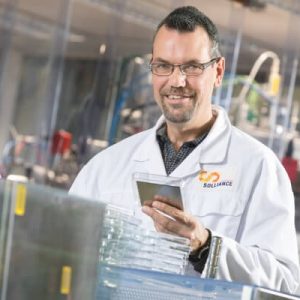
Peter Toonssen, programme manager at the Solliance research institute, believes we are barely scratching the surface of what solar energy has to offer. ‘Working closely together with businesses, our flexible solar cell solutions could provide a real breakthrough.’
Around seven years ago, manufacturers in the solar energy sector started demanding more innovation and research. To meet this demand, Solliance was set up in 2010, with ECN, TNO and IMEC as its main partners. The province of Noord-Brabant provided multi-million backing to ensure that the research site would actually come to fruition at the High Tech Campus in Eindhoven. Toonssen explains: ‘We present ourselves as a real business, but we are actually more of a partnership. We develop equipment for the industry, who in turn commercialise our innovations.’
Breakthrough
‘The challenge we face with flexible, super-thin solar cells is developing a semi-finished product that’s easy to integrate’, Toonssen continues. ‘And that’s my responsibility. We’ve only just started work on this, and we’re currently getting parties from the construction, infrastructure and transport sectors on board with our ideas. Looking at construction, for example, roofs are the obvious solution. But buildings will never become zero-energy if we only use roof surfaces, so we have to start thinking about their facades: that’s where our solutions must be incorporated in the future.’
Momentum
‘There is so much inefficiency in current working methods: so many businesses in the construction chain are working in a linear way, instead of coming together. We would like builders, insulation specialists and lighting experts to work together to integrate our solutions. I believe there is real momentum right now for process breakthroughs of this type. We’re currently developing the technology, and soon this will be realised through cooperation in the construction process.’
Philosophy
Solliance insists that it is not a business: ‘We want to enable businesses to innovate, and of course, our budget is sound. Our solutions are scalable and can be produced in high volumes – and that’s where we differ from a lot of other research initiatives. I’ve got complete confidence that this is the right approach to adopt. We’re currently barely scratching the surface of solar energy, and I believe the key to unlocking its future potential is integration in buildings, among other places. The only thing holding this back is the moderate level of technical complexity, and that’s why Solliance was set up.’
Patents
We asked Toonssen whether patents are necessary for Solliance, and he agreed: ‘Thanks to our patents, we receive a percentage of each device sold, if our innovations are commercialised. That income is then reinvested in knowledge development. Without patents, we would face a funding problem at a later stage: research subsidies are already being cut. Our partners also expect us to have a patent portfolio. If we haven’t got that sorted, they simply won’t work with us.’

